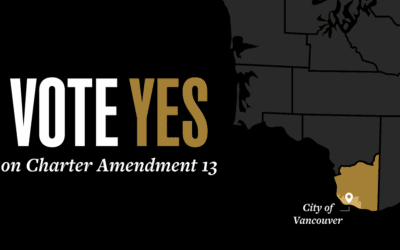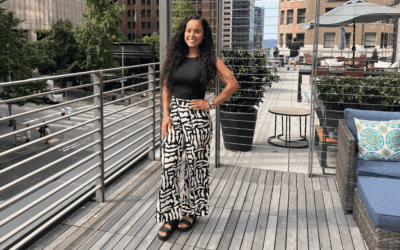Until Feb. 1, 2023, we were Group Health Foundation. This post was written under our former identity. To learn more about our new name, read our announcement here.
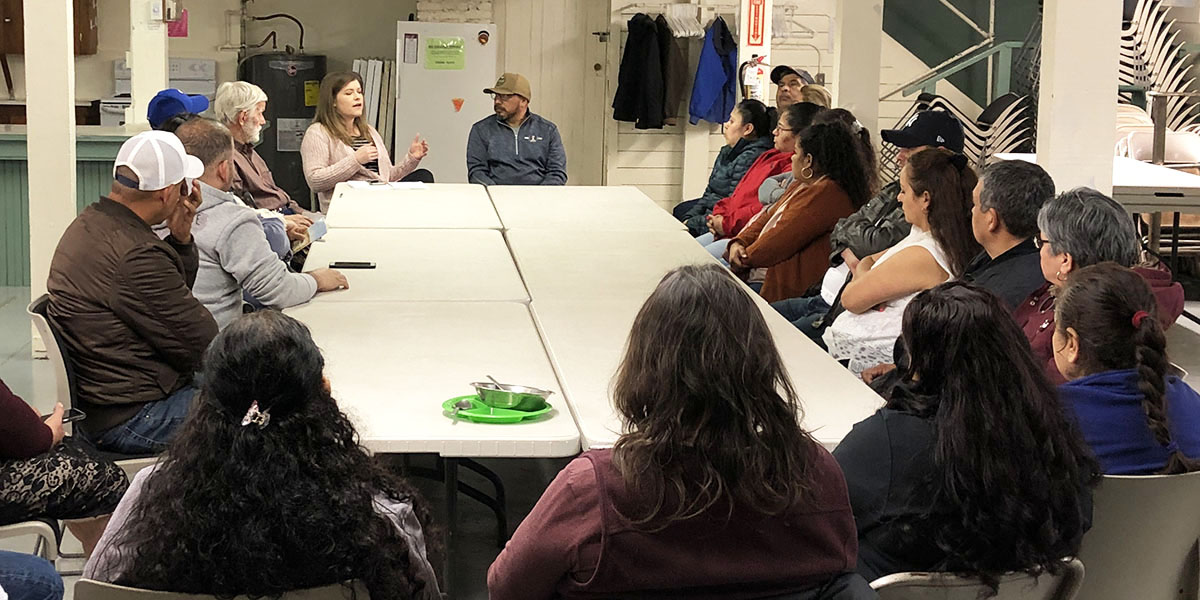
White Salmon residents organize against evictions with the support of environmental and social justice organization Comunidades. (Photo: Comunidades)
At the start of the year, Ubaldo Hernández caught up with a friend he hadn’t seen in a while. The last time they met, his friend mentioned he was worried because the owner of his residential community had just asked all households to suddenly sign a one-year contract.
Ubaldo’s friend had been living in a mobile home park in northeast White Salmon for 10 years. Some families had been there for more than two decades. Not once were they asked to sign such documents.
“When the residents asked why, the owner said there was nothing to worry about, that he just wanted to keep track of how many people lived there,” recalled Ubaldo. “I wanted to ask my friend about it again because it didn’t sound right.”
Two weeks after signing, his friend and other residents were given an eviction notice ordering them to leave the mobile home park in one year, by end of July 2020. Ubaldo’s friend said the residents were fighting the eviction and Ubaldo offered the help of his organization.
With leadership from Ubaldo, a senior organizer with Columbia Riverkeeper, Comunidades formed in 2018 as a Latino/a/x-led environmental and social justice organization in the Columbia River Gorge. Comunidades works to amplify voices for environmental and social justice, while increasing Latino/a/x engagement and leadership in Gorge communities. Today, Ubaldo provides staffing support for the otherwise volunteer-led Comunidades.
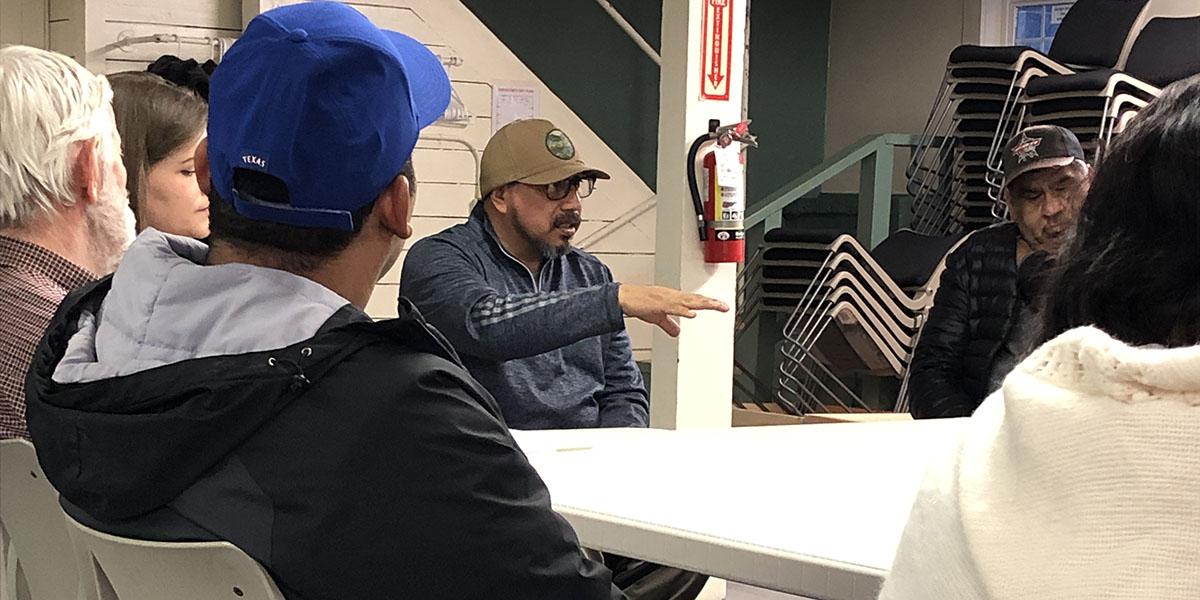
Ubaldo Hernández (center) facilitates a discussion with residents organizing against eviction from a mobile home park in northeast White Salmon. Some had been living in this residential community for decades. (Photo: Comunidades)
“Whenever environmental injustice happens it reflects on our community as a social injustice,” Ubaldo said, adding that for communities of color environmental issues are very personal. “For Native communities, salmon conservation is about their sustenance, their way of life, their traditions,” he offered as an example. “For the many farmworkers who are Latino, it’s about how their health is suffering from exposure to pesticides.”
Comunidades is not a tenant rights organization, but Ubaldo considers this eviction a direct result of the environment in which they reside. White Salmon—the second largest city in Klickitat County—has turned into a popular tourist destination for outdoor recreation. Real estate companies are buying properties, increasing rents, and creating shortages in affordable housing. The mobile home park owner wanted to cash in, Ubaldo said.
The eviction set off a series of difficult decisions for residents, many of whom are immigrants from Mexico and Guatemala who work on farms or in food processing plants. Even with the one-year notice, affordable housing in White Salmon would be near impossible to find. Not only must the residents find a new home, they might have to do so in a new and unfamiliar city. For some, this meant uprooting their children from the only school district they’ve known.
Additionally, the property owner ordered residents to remove their homes themselves or pay the owner to do it. “These trailers are really old,” Ubaldo said. “A lot of the residents were not the original homeowners and bought them from someone else when it was already in the lot. Asking the families to pull them apart meant they would be exposed to chemicals, lead, asbestos. A professional is needed for this kind of removal, but many families didn’t have the $7,000 it would cost to do it.”
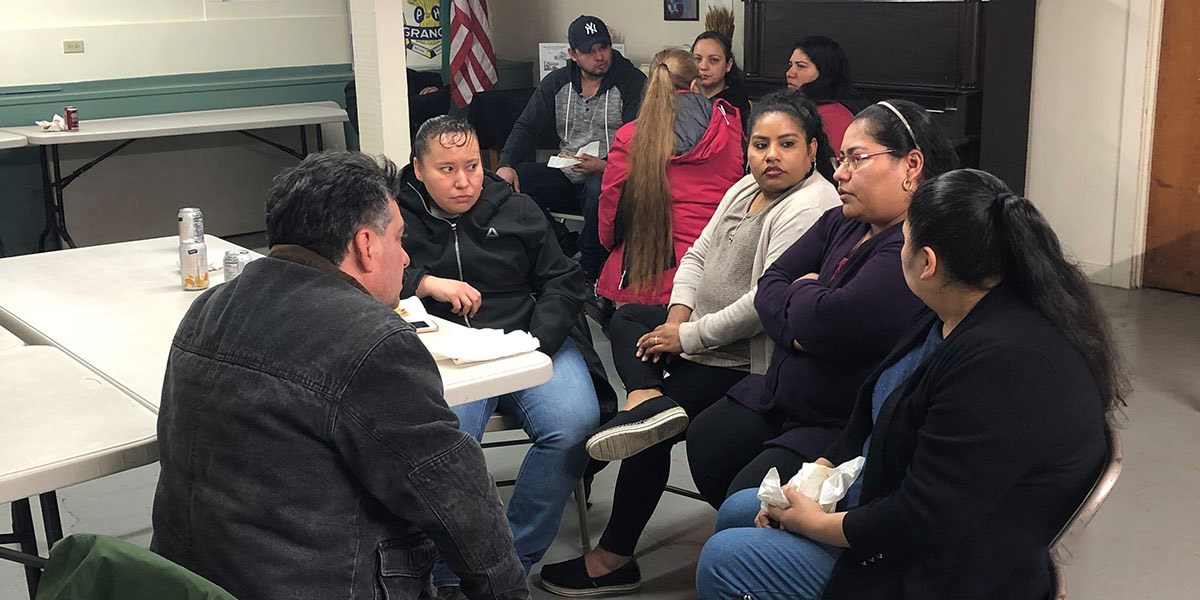
Residents of a mobile home park in northeast White Salmon during one of their weekly meetings to organize against evictions. (Photo: Comunidades)
Comunidades coordinated weekly Saturday meetings for the mobile home park residents. Ubaldo invited the mayor and city council members to a few meetings so they could talk to residents directly. He also brought in Northwest Justice Project for legal help and Washington Gorge Action Programs for food assistance.
“At the meetings, we talked about organizing. We asked residents, ‘How do you feel?,’ ‘How active do you want to be?’ and they said want to stay and fight and protect their rights,” shared Ubaldo. The residents decided that they wanted to advocate for themselves at the next city council meeting. Comunidades offered public testimony training to those who needed it.
Comunidades and about 15 residents attended the February city council meeting. Residents were hesitant at first so Ubaldo spoke first to set the stage. After Ubaldo, a resident stood up and shared with the council his experiences of being homeless, having difficulty finding housing, including paying the fees associated with relocation.
Afterward, the residents felt encouraged and wanted to be better prepared for the next meeting. They continued to gather every Saturday for practice and to organize with their lawyer.
The March city council meeting was a full house. “It was empowering to see these moms, Latinas, tell their stories in their own language, in Spanish. They talked about how the evictions have hurt their families and demanded the city council and the mayor to prevent this situation from happening again,” Ubaldo said.
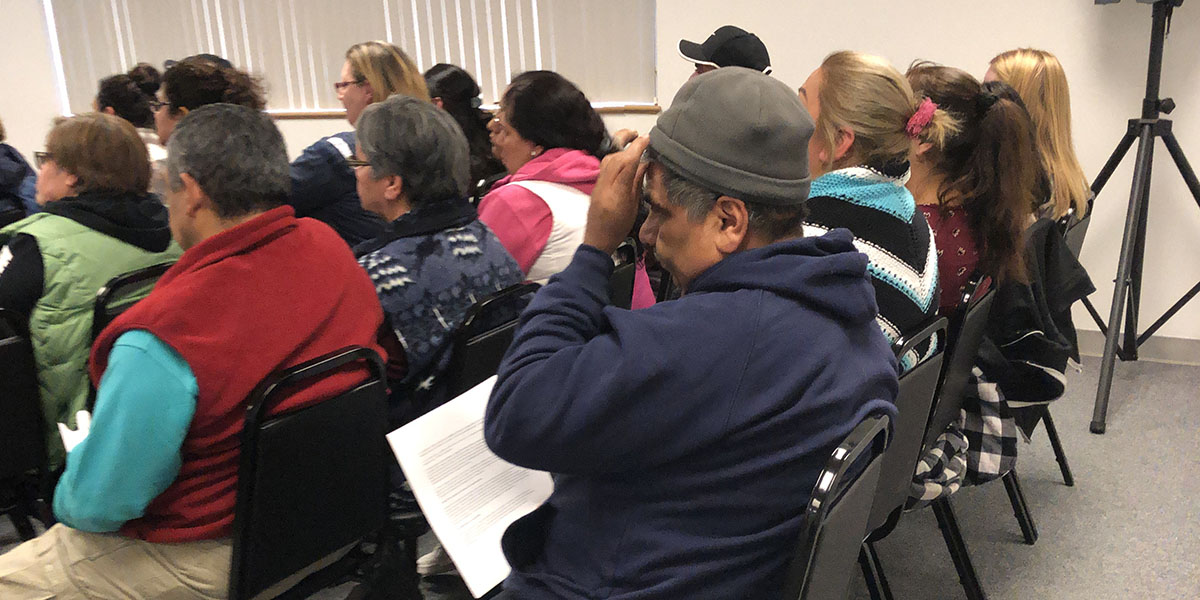
The residents fill up the room at the White Salmon Valley City Council meeting in March. (Photo: Comunidades)
Shortly after the March meeting, the state issued a shelter-in-place order in response to the coronavirus pandemic. Technology access made it difficult to continue organizing, but in their two months of work, the residents made lasting impact, Ubaldo said.
Earlier this month, the White Salmon City Council approved changes to codes for mobile home communities to preserve affordable housing options in White Salmon, including prohibiting property owners from developing built-in homes in areas zoned for mobile homes. Additionally, property owners must pay relocation costs of residents they evict.
These rules did not happen in time to help the residents who organized for them. Still, many were happy that they made a difference for mobile home park families in the future. A lot of the residents who organized had been living in White Salmon for decades and some had been evicted once or twice before.
Ubaldo said he feels uneasy about not being able to do more for the residents. They have all moved on, with many leaving White Salmon to find new places to live. The situation has also broken up a few households because some family members didn’t want to leave.
“It’s really frustrating because, as a community organizer, you encourage people to participate, to organize, to be engaged in the civic process,” Ubaldo said. “But at times it felt like I was lying to them because regardless of what they did, the tenant laws didn’t protect them.”
He is keeping in mind the gains they made. The city council meeting in March was very emotional for Ubaldo—who moved to White Salmon from Mexico City in 1994—because he has never seen so many people from the Latino/a/x community at a city council meeting. They were able to change in a few weeks what special interest groups spent years putting into place.
“Before the residents showed up, the only people who attended the city council meetings were developers, real estate agents, and people who owned a lot of properties,” said Ubaldo. “It’s how systemic racism persists and how discriminatory practices against low-income people and people of color happen.”
Comunidades will soon hire its first full-time staff person. Inspired by his friend and the other residents, Ubaldo said they are discussing plans to form a tenant rights organization.
Comunidades is one of the organizations who received a Community Learning Grant in 2019. Stay in touch with Comunidades by following them on Facebook.

